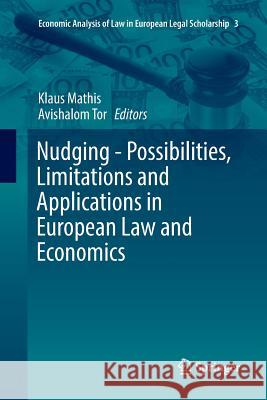Nudging - Possibilities, Limitations and Applications in European Law and Economics » książka
topmenu
Nudging - Possibilities, Limitations and Applications in European Law and Economics
ISBN-13: 9783319806006 / Angielski / Miękka / 2018 / 382 str.
Kategorie:
Kategorie BISAC:
Wydawca:
Springer
Seria wydawnicza:
Język:
Angielski
ISBN-13:
9783319806006
Rok wydania:
2018
Wydanie:
Softcover Repri
Ilość stron:
382
Waga:
0.56 kg
Wymiary:
23.39 x 15.6 x 2.08
Oprawa:
Miękka
Wolumenów:
01
Dodatkowe informacje:
Wydanie ilustrowane











